EXTERNAL AUDITOR APPOINTMENT IN INDONESIAN STATE-OWNED ENTERPRISES: THE ROLE OF POLITICAL CONNECTION AND ACCOUNTING IRREGULARITIES
DOI:
https://doi.org/10.21512/jafa.v10i1.8904Keywords:
Political Connection, Accounting Irregularities, Auditor Choice, Auditor Switching, State-Owned EnterprisesAbstract
This research investigates how political connections and accounting irregularities affect the auditor appointment decision in Indonesian state-owned enterprises. This research considers auditor choice and switching decisions as its dependent variables. Political connection is calculated as a percentage of the firm's board of directors and commissioners with political connections. Accounting irregularities are calculated with Beneish M-Score. Employing the 235 firm-year observations from 2014 to 2018 using logit regression, this research documents the following results: (1) Political connection has a significant negative influence on auditor choice. (2) Accounting irregularities have a weak significant negative influence on auditor choice. (3) Political connection has no significant influence on auditor switching. (4) Accounting irregularities have no significant influence on auditor switching.
References
D. Acemoglu, S. Johnson, A. Kermani, J. Kwak, T. Mitton. (2016). The value of connections in turbulent times: evidence from the United States. Journal Finance. Economic., 121 (2) (2016), pp. 368-391.
I. Babenko, V. Fedaseyeu, S. Zhang. (2020). Do CEOs affect employees’ political choices? Review Financial Study., 33, pp. 1781-1817.
Chiang, S. L., L. H. Huang & H. C. Hsiao. (2011). Study of Earnings Management and Audit Quality. African Journal of Business Management, Vol. 5(7), pp. 2686–2699. Doi: 10.5897/AJBM10.1040.
Claessens, S., Djankov, S., Fan, J. P. H., & Lang, L. H. P. (2002). Disentangling the Incentive and Entrenchment Effects of Large Shareholdings. The Journal of Finance, Vol. 57(6), pp. 2741–2771.
Fisman, R. (2001). Estimating the value of political connections. American Economic Review, Vol. 91 (4), pp. 1095–1102.
Guedhami, O., Pittman, J. & Saffa, W. (2009). Auditor choice in privatized firms: empirical evidence on the role of state and foreign owners. Journal of Accounting and Economics, Vol. 48 (2), pp. 151–171.
Guedhami, O., Pittman, J. and Saffa, W. (2014). Auditor choice in politically connected firms, Journal of Accounting Research, Vol. 52 No. 1, pp. 107–162.
Habib, A., Muhammadi, A. H., & Jiang, H. (2017). Political connections, related party transactions, and auditor choice: Evidence from Indonesia. Journal of Contemporary Accounting and Economics, Vol. 13 (1), pp. 1–19. https://doi.org/10.1016/j.jcae.2017.01.004
Kitiwong, W., S. Verma., & K. Anderson. (2014). Earnings Management and Audit Quality: Evidence from Southeast Asia. Thesis: University of York.
Klapper, L. F., & Love, I. (2004). Corporate governance, investor protection, and performance in emerging markets. Journal of Corporate Finance, Vol. 10, pp. 703–728. https://doi.org/10.1016/S0929-1199(03)00046-4.
La Porta, R., Lopez-de-Silanes, F., Shleifer, A. & Vishny, R.W. (1998). Law and finance. Journal of Political Economy, Vol. 106 (6), pp. 1113-1155.
Prayugi, G. (2015). Pengaruh Kepemilikan Perusahaan, Corporate Governance dan Earnings Management terhadap Tipe Auditor dan Audit Fees. Jurnal Akuntansi Indonesia, Vol. 42, pp. 109 – 122. http://jurnal.unissula.ac.id.
Downloads
Published
Issue
Section
License
Authors who publish with this journal agree to the following terms:
Authors retain copyright and grant the journal right of first publication with the work simultaneously licensed under a Creative Commons Attribution License that allows others to share the work with an acknowledgement of the work's authorship and initial publication in this journal.
Authors are able to enter into separate, additional contractual arrangements for the non-exclusive distribution of the journal's published version of the work (e.g., post it to an institutional repository or publish it in a book), with an acknowledgement of its initial publication in this journal.
Authors are permitted and encouraged to post their work online (e.g., in institutional repositories or on their website) prior to and during the submission process, as it can lead to productive exchanges, as well as earlier and greater citation of published work (See The Effect of Open Access).





